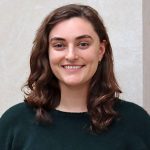M.P.S. in Digital Curation and Management
Overview
The Master of Professional Science (MPS) in Digital Curation and Management program provides the knowledge and experiences to help you launch a new career or advance to a new level in a wide range of businesses and organizations in both the public and private sectors.
Through this innovative, online master’s program, you can complete course work anywhere in the world that has an internet connection, and at whatever times best fit your schedule. We designed this program with working professionals in mind.
Curriculum
The MPS in Digital Curation and Management requires a total of 30 credit hours of coursework, including:
- An internship where students can apply their knowledge to practice
- Intensive digital curation coursework
- Business and professional skills training
- INLS 722 Introduction to Metadata Architectures and Applications (1.5)
- INLS 750 Introduction to Digital Curation (3)
- INLS 751 Data Governance (3)
- INLS 765 Information Technology Foundations for Managing Digital Collections (1.5)
- INLS 766 Audit and Certification of Trustworthy Digital Repositories (1.5)
- INLS 767 Information Assurance (3)
- INLS 800 Seminar Series in Digital Curation (1.5)
- INLS 992 Master’s Non-Thesis (3)* Please note this class currently requires either an internship ONLY for the MPS program
Students may select from the following:
- INLS 556 Introduction to Archives and Records Management (3)
- INLS 560 Programming for Information Professionals (3)
- INLS 561 Digital Forensics for Curation of Digital Collections (3)
- INLS 572 Web Development I (1.5)
- INLS 573 Mobile Web Development (1.5)
- INLS 712 Introduction to Text Mining (1.5)
- INLS 714 Introduction to Information Analytics (1.5)
- INLS 724 Introduction to Electronic Records Management (1.5)
- INLS 726 Introduction to Big Data and NoSQL (1.5)
- INLS 761 Data Analysis (1.5)
- INLS 772 Applied Statistics, Machine Learning, and Data Communication (3)
- INLS 773 Database for Data Science (1.5)
- INLS 774 Applied Data Ethics (1.5)
Program Faculty
SILS is home to some of the foremost digital curation and preservation experts in the world, most notably Digital Curation & Management Program Director Helen Tibbo and Professor Cal Lee, who has pioneered preservation policies and standards for “born digital” materials.
SILS faculty are also internationally recognized thought leaders in information retrieval and organization, text data mining, machine learning, task-based search, and large-scale data management. They have designed online courses that incorporate their research expertise and classroom teaching experience, offering a curriculum that can prepare you for both the current and future challenges of digital curation.
Explore faculty profiles to learn more about their expertise and research interests.
As the world continues to become more and more digital, the MPS in Digital Curation has helped me to ensure that I have a job in the workplaces of the future while also helping to preserve my county’s history. Faculty support has been phenomenal, especially Professor Tibbo. My original lack of technology skills was treated with simplified explanations and patient understanding as I figured it out.
– Lisa Lawless, Branch Librarian at Danbury Public Library
Careers
FAQs
Digital curation is lifecycle management of durable digital content. This includes the selection, preservation, maintenance, collection, and archiving of digital assets. Successful digital curation safeguards data authenticity and integrity, and mitigates digital obsolescence, keeping files and information accessible to users indefinitely.
Digital curators develop and implement policies to ensure that data and other digital assets remain FAIR (Findable, Accessible, Interoperable, and Reusable).
A Master of Professional Science (MPS) program is designed for students who want to develop expertise in a specific area, while also acquiring valuable business skills.
MPS degrees are sometimes referred to as non-thesis or non-research master’s degrees. They do not offer preparation for PhD-level studies.
While MPS students may conduct original research as part of their capstone projects, MPS programs emphasize knowledge proficiency and professional competencies. MPS students graduate ready to apply what they have learned in the workforce at a wide range business, government, and nonprofit organizations.
The master’s program in digital curation and management offers asynchronous learning. You can log-in at anytime day or night to access course texts, recorded lectures, and other materials. However, most courses require weekly contributions to online discussion forums and completion of various assignments by deadlines set throughout the semester.
Digital curation encompasses digital asset management, data curation, digital preservation, and electronic records management.
These terms are sometimes used interchangeably, though specific terms may be more recognized in certain fields or industries. For instance, healthcare professionals are more likely to discuss electronic health records (EHR) management, whereas scientists will more often refer to data curation or management.
The master’s program in Digital Curation & Management at Carolina can help you learn the vocabulary and concepts needed to communicate with various constituencies within your organization, as well as with other curation professionals.
Data science and data analytics professionals work to extract insights and meaning from data. Digital curation experts make sure that data is authentic, secure, and accessible. They engineer the digital scaffolding necessary for data-driven research and innovation.
Digital curation also expands beyond just data to all files that are stored in digital format, from photos and videos to formulas and patents.
Admissions Information
For complete details on application deadlines, tuition, financial aid, and the application process, visit our master’s degree information page.
 Questions?
Questions?
Contact Eleni Papadoyannis
Doctoral & Special Programs Coordinator
919-962-0182 or epapa@unc.edu





